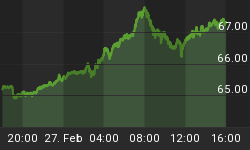This week marked the beginning of what I believe is the manic bubble stage in the nearly three decade long Treasury bull market. On Monday, the U.S. Department of Treasury sold $27 billion of three month bills at a discount rate of .005%. That rate is the lowest since the auction began in 1929. On Tuesday, $30 billion of four-week Treasury bills were sold at 0%! Again, the lowest yield ever recorded for that security.
According to data compiled by Bloomberg, 41 U.S. money market funds have daily annualized yields at or less than .05% including four funds with a yield of zero. If one needed more evidence of this epic bubble, you could find it in the fact that a 2-year Treasury note yields just .8% and a 1 year bill offers a paltry .45% as of today's trading.
Now there are those who are claiming these yields are justified because we are entering a Japanese-style lost decade of deflation -- Merrily Lynch's chief North American economist David Rosenberg was espousing that belief just this morning on CNBC's Squawk Box. What Mr. Rosenberg chooses to ignore is that Japan has a tradition of one of the highest rates of savings on the planet. And while their virtual zero interest rate policy may not have caused runaway inflation domestically, it has served to inflate asset prices across the world due to the Yen carry trade.
Many who claim that there is justification for today's bond yields are the same folks who claimed back in 2006 that home prices had never before in history declined on a national level and any talk of a bubble in real estate was therefore nonsense. Many of them are also the same people who assured you in the year 2000 that prices of internet stocks were fairly priced because they should be valued by the number of eyeballs that view a webpage.
To receive zero percent interest after loaning your money to the government for one month is ridiculous. Even more absurd is to hand over your money for 10 years and receive just 2.64% per annum. In order to believe you will receive a real rate of return on that trade, you have to assume the rate of inflation will average far below the after tax return on that bond--well below 2%!
The fact is, Treasury issuance is set to increase dramatically as our annual budget deficits are projected to be well north of $1 trillion dollars for at least the next few years. Along with the increasing debt supply, there is a huge increase in potential inflation from the expansion of the Fed's balance sheet and a Fed Funds rate that is quickly approaching zero. Those two factors alone paint a very ugly picture for the direction of bond prices. Manias can last a very long time and become more extended than reason should allow. But wise investors should eschew owning Treasuries and continue to accumulate inflation-sensitive assets, despite their recent corrections; fundamentals are clearly on their side.
*Please check out my podcast, The Mid-Week Reality Check















